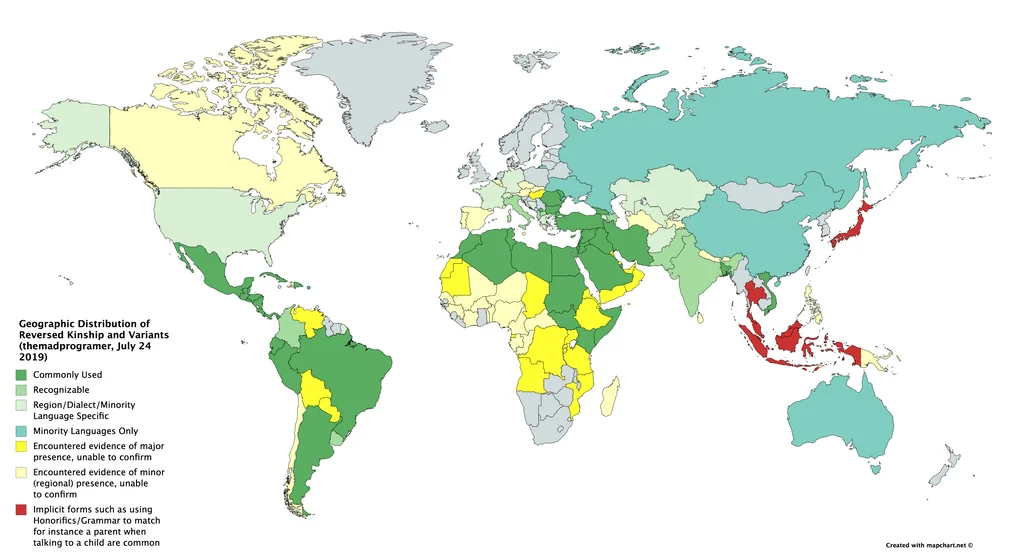Linguistics is broadly the study of language.
Where to find me if you also like linguistics?
- I frequently post to the Cult of Linguists group on Quora.
- I also have a Linguistics Stack Exchange account
Why do I care about linguistics?
Late in middle school I had a realisation that there were billions of people on earth, altogether speaking thousands of languages. In spite of this, we only ever care about the languages that are most immediate to us. The way we live today, no individual can comprehend most of humanity. So I decided I wanted to understand better.
This motivation led me to study various languages, and to study them from different angles. Where “polyglots” might be interested in how to greet people in 30 languages, I was drawn to very obscure details. Here, I will present the example of kinship reversal. Consider how in many cultures, a child calling their parents ‘mother’ or ‘father’ is rather typical. Yet, different from English, in many languages mothers can also address their children as ‘mother’, fathers can call their children ‘father’; for languages that have separate words for older and younger siblings an older one may refer to their younger sibling with the word the younger is expected to refer to the elder as etc. There are several names for this phenomenon, but I choose to call it reversed kinship.

After years of trying to convince people I was not insane, I went out of my way to make an atlas to demonstrate the geographic extent of kinship reversal. You can find more information on this Reddit post. Please note that this 2019 version of the map is outdated and I am working on a revised edition at this time.
This attitude of mine where I compare/contrast different languages, based on my own interests, has put me at great odds with Linguistic Academia. Academic linguistics (almost exclusively) revolves around the comparative study of Indo-European languages. The alternative is to treat every language as an island, as many researchers who want to focus on a single language do, and that too never sat right with me. In the end, I ended up becoming the most amateur linguist I know. And so it’s always hard, to dare go talking to academic linguists on having observed patterns such as Hausa, Turkish and Vietnamese employing fairly similar rules for alliterative duplication despite being separated historically, geographically and sociopolitically. It’s so out of left-field even for people who do this as a full-time job. Yet it comes naturally to me.
I have had people advise me to move instead in the directions of anthropology or archaeology, but I decided to study computer engineering and data science instead. Perhaps the GPT hype will make linguistic research more economically viable, yet until then I have relegated my linguistic interests to only a hobby.
Why should you care about linguistics?
- Linguistics is humbling. Every day you study linguistics, you learn something you never knew before. Maybe a forgotten word, perhaps an untranslated concept.. You realise how little you knew before and what you did know gains a much heavier contextual meaning.
- Linguistics is enlightening. The world becomes less of a map with borders and instead a swimming pool. Things that would have seemed blurry or alien before, slowly become more visible. I swear, there are few things more satisfying than becoming literate in a new writing system.
- Linguistics is liberating. A language is a dialect with an army and navy as Weinreich’s saying goes. The way we look at and understand language determines the roles people play in society. Understanding language, therefore, helps one see through societal illusions and instead realise meaningful ideals.